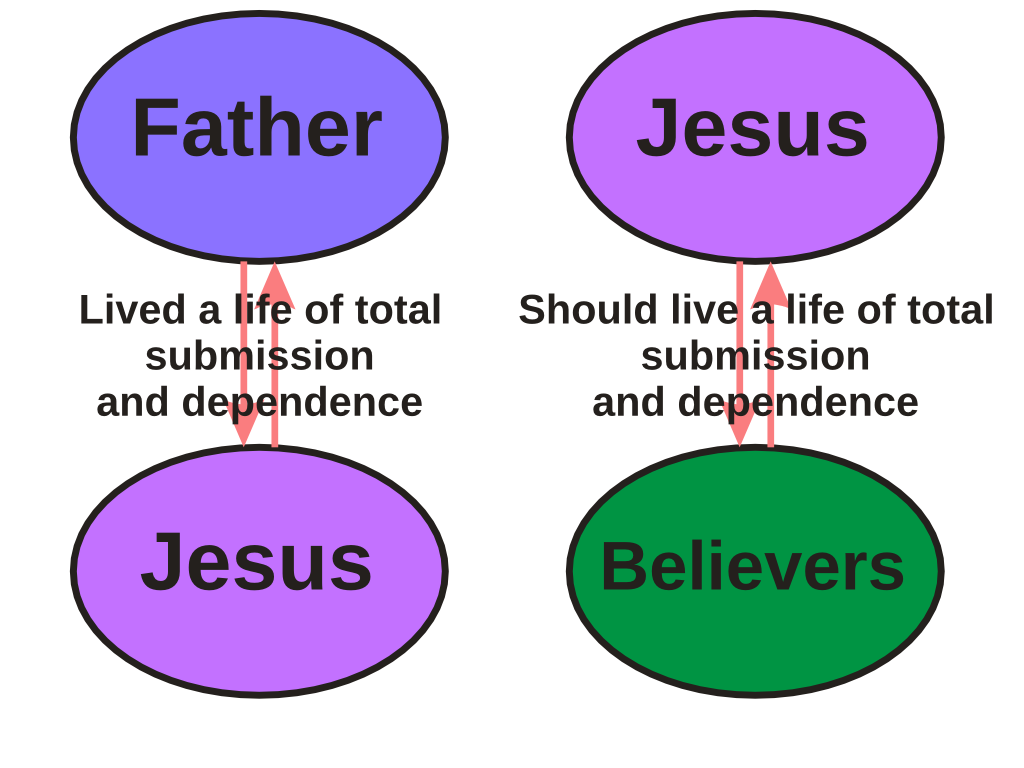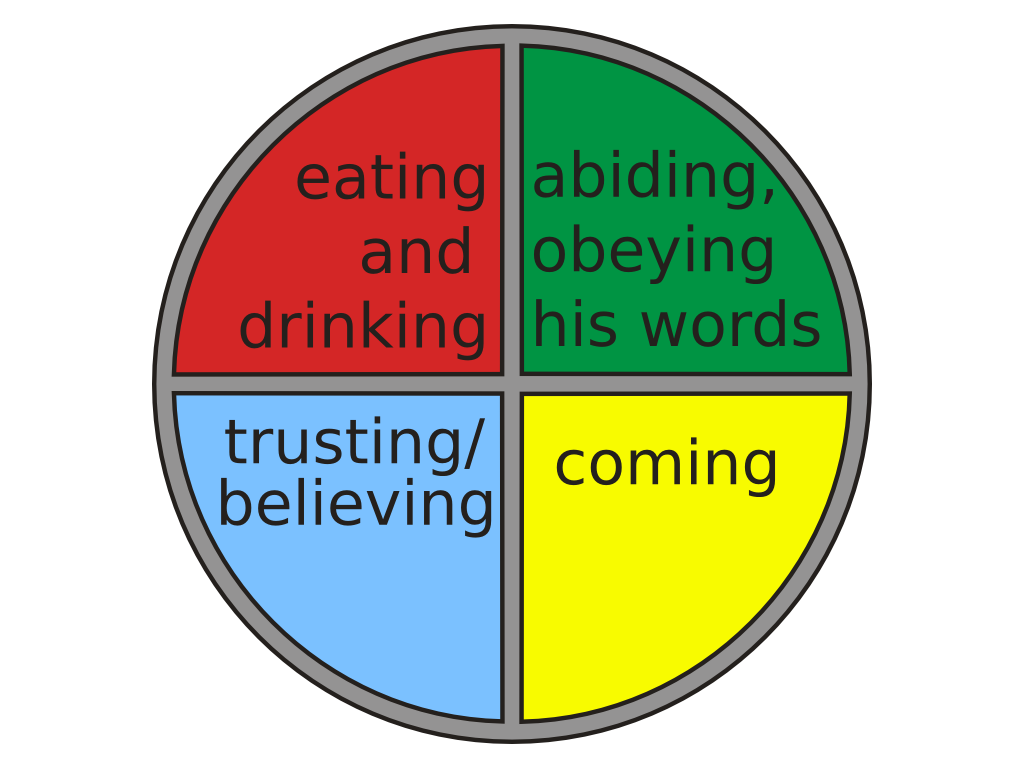- We saw that v.57 is a key verse to understanding this passage
- Jesus compares our relationship with him to his relationship to the father
- We must feed on him as he feeds on the Father.
- He does this by utter submission and dependence, just as we should submit to Christ and depend on him.
Jesus placed himself into a relationship with the Father which is a pattern for our relationship with him.
- We saw the same imagery when Jesus talked to the woman at the well:
- There a pattern in these verses.
- Jesus describes our relationship with him in the same terms as his relationship with the Father.
- In chapter 4, Jesus had been so busy serving his Father that he had not eaten.
- Doing the Father’s will, was his food, because his obedience was so complete that it amounted to a moment by moment dependence.
- Why does Jesus use such shocking language?
- Sometimes we are so stuck in one mindset we need to be shocked out of it
- Lighthouse story as told by Frank Koch in Proceedings, the magazine of the Naval Institute
- Two battleships assigned to the training squadron had been at sea on manoeuvres in heavy weather for several days. I was serving on the lead battleship and was on watch in the bridge as night fell. The visibility was poor with patchy fog, so the captain remained on the bridge keeping an eye on all activities.
- Shortly after dark, the lookout on the wing of the bridge reported, “Light, bearing on the starboard bow.”
- “Is it steady or moving astern?” the captain called out.
- Lookout replied, “Steady captain,” which meant we were on a dangerous collision course with that ship.
- The captain then called to the signalman, “Signal that ship: We are on a collision course, advise you to change course 20 degrees.”
- Back came a signal, “Advisable for you to change course 20 degrees.”
- The captain said, “Send: I’m captain, change course 20 degrees.”
- “I’m a seaman second class,” came the reply. “You had better change course 20 degrees.”
- By that time the captain was furious. He spat out, “Send: I’m a battleship. Change course 20 degrees.”
- Back came the flashing light, “I’m a lighthouse.”
- We changed course.
- Jesus intends us to radically change course in our lives.
I want to spend some time now looking at the image of eating...
- Does David literally mean that these are cannibalistic enemies or is he using picture language?
- He is talking here about the wicked who want to profit from his death.
- They want to kill David because they want to obtain some kind of benefit from his death, e.g. money or power
- This example from the Old Testament gives us an insight into what Jesus means by eating his flesh—it means to benefit from his death on the cross.
- Interestingly enough, there is an occasion in David’s life where he also uses the image of drinking blood.
- he gathered a group of mighty men around him
- At one point and he remarked how much he would love a drink from the well of Bethlehem.
- Three of his mighty men heard this and took him seriously.
- They fought their way through the Philistine lines, got water from Bethlehem and brought it back to David.
- He says that to drink this water would be like drinking the blood of these men,
- not literally their blood, but it would be like profiting from their near death, since they risked their lives for him.
- You could say, enjoying the benefits which came at the expense of their lives.
- he gathered a group of mighty men around him
- Perhaps the most powerful image that these words have is simply that of the food and drink that sustains our lives.
- Food is something we all need moment by moment to sustain us.
- We cannot go long without a drink because liquid is vital for our bodies.
- There is another place in John’s Gospel where Jesus uses an image to demonstrate how the believer is sustained moment by moment from himself.
- It is the image of the vine and the branches.
- A branch, cut away from the vine, is cut away from the sap—that source of nourishment and fluid flowing up—and would die straight away.
- We must be joined to Christ and constantly feeding from him and drawing sustenance from him in order to be sustained.
- That is the idea behind this passage, but we must ask
- What does this actually mean in practice?
- Looking at these references allows us to build up an image of what Jesus is talking about.
- Here, quite clearly, eating his flesh and drinking his blood is equivalent to abiding in him
- which we learned from chapter 15 is obeying his words.
- practical examples
- Used to be very shy—new person in church
- This is moment by moment
- I knew someone was spreading stories about me. Jesus said to go to them. Very hard to do
- pioneer
- In Southern Ontario, along the shores of Lake Erie, there is a highway called the Talbot Trail. At the beginning of the last century, it was all just wilderness and Mr. Talbot was commissioned by the government to sell tracts of land. Sales were very poor until it dawned on him that people would not buy land that they could hardly even get to—there were no roads in this wilderness. He decided that he would cut a trail through the forest to open up the interior. Many people followed him and sales prospered. The road is still there and has now grown into a highway which is still called the Talbot Trail.
- Jesus has done the same thing. He is the pioneer.
- He has cut a trail through this impossible forest so that we can follow him and we can obey.
- He is the obedient one, who has lived a life of submission, of dependence, and of following the Father.
- His life was not merely a good example to us. By means of our union with him in the Spirit,
- his victory becomes ours and we fight a battle that he has already won.
- a combination of trust and dependence
- example of being in a strange city—trust/follow/depend on someone
- If you are not a Christ follower, this is exactly for you as well!
- life of God in us by the Spirit





